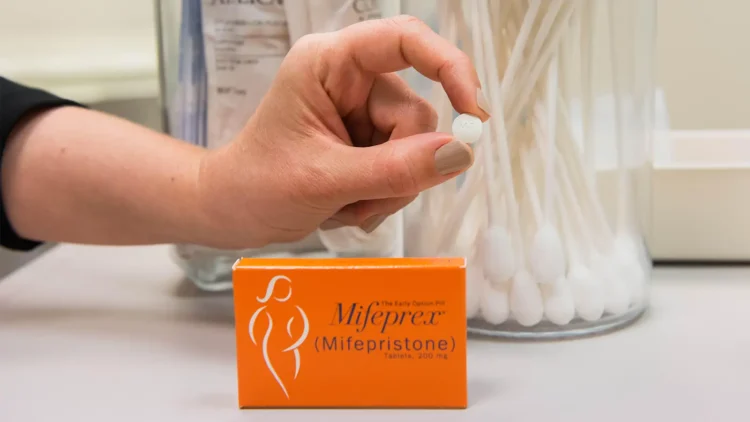By Aaron Miller-
In a recent turn of events, the US appeals court has delivered a ruling that reverberates through the corridors of reproductive rights and healthcare access.
The New Orleans-based 5th U.S. Circuit Court of Appeals stopped short of ruling that the drug must be pulled off the market altogether, as a lower court had done.
The ruling, which stems from a lawsuit brought by four anti-abortion groups headed by the recently formed Alliance for Hippocratic Medicine and four anti-abortion doctors who sued in November, will not take effect until the Supreme Court reviews it, which could occur in its upcoming term from October to June.
The groups assert that the FDA used an improper process when it approved mifepristone in 2000 and did not adequately consider the drug’s safety when used by minors.
“The 5th Circuit rightly required the FDA to do its job and restore crucial safeguards for women and girls, including ending illegal mail-order abortions,” Erin Hawley of Alliance Defending Freedom, a lawyer for the anti-abortion groups challenging the pill’s approval, said in a statement.
A spokesperson for the U.S. Department of Justice said that the Biden administration will appeal the ruling to the U.S. Supreme Court. President Joe Biden, a Democrat, supports abortion rights and last year ordered the federal health agency to expand access to mifepristone
The court’s decision to limit access to the abortion pill mifepristone has ignited a contentious debate over the delicate balance between medical regulation, women’s rights, and public health.
While the ruling does not pull the medication off the market, it effectively halts its more accessible distribution channels, marking a retreat to regulations from several years ago. This article delves into the significance of this ruling, its implications for reproductive healthcare, and the complex intersection of policy, medicine, and individual choice.
The US court of appeals for the fifth circuit’s recent ruling serves as a step back in time, as it returns to regulations surrounding the abortion pill mifepristone that were in place several years ago.
In a legal decision with far-reaching consequences, the court deemed the Food and Drug Administration’s (FDA) previous regulations for mifepristone unlawful, effectively overturning some of the medication’s more recent access expansions. It’s crucial to note that this ruling does not ban mifepristone; instead, it alters the conditions under which the medication can be obtained, putting a spotlight on the intricacies of the debate over reproductive rights.
Reproductive Rights Under Scrutiny
The decision to limit access to mifepristone brings into focus the complex web of reproductive rights in the United States. With each legal turn, the delicate balance between a woman’s autonomy over her body and the role of regulatory bodies in ensuring medical safety comes into sharp relief.
The FDA’s initial relaxation of restrictions on mifepristone aimed to make the medication more accessible, allowing it to be taken at a later stage in pregnancy and expanding its prescription base beyond doctors. However, this recent ruling sends a signal that the judicial system is attempting to recalibrate this balance, leading to intense discussions about the consequences for women’s healthcare.
Balancing Individual Choice and Public Health
While reproductive rights advocates are alarmed by the decision, the court’s ruling does have nuanced underpinnings. Balancing the right to individual choice with public health considerations is a formidable challenge, and this decision underscores the legal system’s attempts to navigate these complexities.
The ability to obtain the abortion pill online or through non-traditional sale methods has garnered attention in recent years, with both proponents and opponents articulating their views on whether such methods prioritize personal autonomy or undermine medical oversight. The court’s ruling reflects the need to carefully assess these concerns within the framework of women’s reproductive health.
Impact on Accessibility and Healthcare Equity
One of the significant implications of the court’s decision is its potential impact on accessibility and healthcare equity.
The restrictions on mifepristone’s distribution channels could disproportionately affect individuals with limited access to traditional healthcare facilities, including those living in rural areas or facing economic barriers.
Advocates for reproductive justice argue that limiting access to the abortion pill could exacerbate existing healthcare disparities, further marginalizing vulnerable populations and hindering their right to make informed choices about their bodies.
Unraveling the Threads of Debate
The ruling on mifepristone shines a spotlight on the ongoing debate over women’s reproductive rights and the scope of governmental influence in personal medical decisions. It’s a debate rooted in values, ethics, and differing viewpoints on the role of regulation. While some argue that the ruling safeguards medical safety and ensures proper oversight, others contend that it erodes the autonomy and agency of individuals seeking reproductive healthcare. As this debate rages on, it is evident that these decisions have profound implications for both the women directly affected and the broader landscape of healthcare policy.




